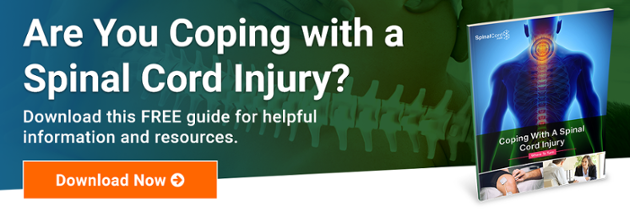What to Do When Strangers Stare at Your Wheelchair
I like to be happy. Life is too short to be otherwise. There is one thing, however, that makes me unhappy: when people stare. I am a wheelchair user, so this happens a lot. To cope, I often tell myself, “This is just what humans do.”
Spinal Cord Team Note: This article is a follow-up post to Tiffiny Carlson’s highly successful “What to Do When People Stare” blog post. We hope that this advice will come in handy for coping with a spinal cord injury (SCI), particularly for dealing with what is often a problematic concern for many spinal cord injury survivors and other wheelchair users: staring people.
Why people stare: Much like sexuality, it’s human nature at its most basic level to stare at things that are different. Other things that appeal to that basic desire is to always have the next best thing, to watch or engage in blood-sports, or to rubberneck at car crashes. Staring is just one of those unseemly side effects of being human we can't help. However, learning how to react when someone stares at you is important if you want to get through life while remaining as happy as possible.
We can't change the fact that people stare, but we can teach you how to deal with that uncomfortable situation. There isn't a one-size-fits-all answer for every time it happens, and kids get a free pass due to their natural curiosity. Almost everyone else, when they stare… it could mean that they may have some negative emotions tied to their actions. You will need to figure out how to best deal with them, and we have put together a few tips on just how to accomplish this task.
1: Stare Right Back
When someone is staring for too long (well over a minute), I like to stare right back at them. A typical human response is to look away when someone stares. It can make you feel nervous; no one likes to be stared at, after all. This is why it's staring back is so effective.
You’re giving them a taste of their own medicine, and this is a fitting response. It teaches them a quick yet profound lesson about the inappropriateness of their actions — in this case, staring at people who use wheelchairs for too long of a time. I'm ok with a glance, but an outright stare for 30 plus seconds? Not okay. After you give them the hard stare (or glare) for as long as you can muster, they will eventually look away. Just watch the magic occur.
2: Start a Conversation with Them
If you are the type of person who believes in the good of everyone and that they can become disability-friendly if they have a positive encounter with a wheelchair user, then use this opportunity to teach them a little about life with a disability and why staring is actually really problematic.
Essentially, use that moment at the grocery store as a teachable one. We recommend starting the conversation by saying something to the effect of, “I noticed you looking. How are you? I actually have a <insert disability here>” and then go from there.
3: Smile and Wave
It may sound a bit childish, but smiling at someone who is staring directly at you, and then waving at them with your best pageant-style wave, can go a long way in stopping someone from staring. Once they see what you're doing, they usually look away and don’t look at you again. A lot of the times the person staring at you won't even realize that you've noticed them mid-stare, so the wave and smile serve two purposes: 1) really saying hi, and b) to teasingly make them aware of their social rudeness.
4: Ignore and Roll Off
One of the easiest things you can do is to not get emotionally involved and just ignore the person staring by rolling away. Or, do what I do: turn your back to them wherever you are. You’re not running away; rather, you’re just turning yourself so they have nothing to stare at except the back of your wheelchair. This viewpoint definitely doesn't interest most stare offenders.
The best advice we can give to you is to not allow the actions of people staring at you to make you bitter or have the power to ruin your day. Their eyeballs may roam, and when it happens, assess how to respond and do so in the way that best suits your needs and personality.
Stay Updated on Advancements On Traumatic Brain &
Spinal Cord Injuries
About the Author





